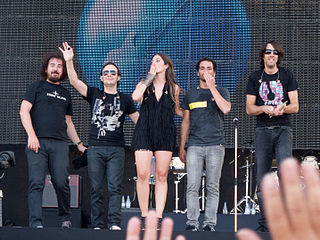
La Oreja de Van Gogh is a Spanish pop band from Donostia-San Sebastián, Spain. The band's lyrics and compositions are written primarily by Xabi San Martín, and additionally by Pablo Benegas. The lyrical themes of their songs typically include love, friendship and relationships. Since their debut, they have sold more than 8 million albums worldwide.
Uruguayan rock first emerged in Uruguay in the 1950s. The real breakthrough for rock in Uruguay, however, as in much of the world, came with the arrival of The Beatles in the early 1960s. Although the country has a small population and is far-removed from the world's cultural centres, rock music from these land, which has always taken on an identity forged from a mix of different cultures and local peculiarities, crossing different genres and styles, has largely been a well-kept secret outside the region. Thanks to the Internet and easy access to music libraries through streaming services such as Spotify, this is now changing.

Gaia is a 2003 album by Spanish folk metal band Mägo de Oz. It is the first rock opera of a trilogy. The album tells of a woman, the reincarnation of Azzak, who after her execution, is relieved of her soul: the soul of Azzak. Gaia, now free of her mortal skin, uses an e-mail to converse with the man who ordered her execution and tells him the story of Azzak and her affair in Colonial times. Upon his finishing the e-mail, she appears before him and it is left as a cliffhanger for Gaia II: La Voz Dormida to finish.
Yolanda Ventura is a dual nationality Spanish/Mexican actress and was a Spanish singer when she was young. She is best known for roles in Mexican telenovelas and is a former member of the Spanish children's music band Parchís. She joined Parchís after a recording company posted an advertisement looking for kids who could sing, dance, and act. A few months later, in 1979, the band was formed and named after the Spanish version of the Pachisi board game. The band was a success in Spain and Latin America, they recorded five albums and filmed seven movies.
El Último de la Fila was a successful Spanish rock group based in Barcelona, Spain. Formed in 1985 by Manolo García and Quimi Portet, the group released a total of 7 full-length albums before disbanding in early 1998.

Ariel López Padilla is a Mexican actor. He is best known for his acting in many telenovelas such as Gata Salvaje, Pecados Ajenos, Inocente de ti. Ariel Lopez works for most famous telenovelas productions principally for Telemundo and Venevision, but also has some credits in Televisa and TV Azteca. He lives in Miami, U.S.

Marcela Morelo is Argentine singer-songwriter. She has released eight critically acclaimed studio albums, which all earned either Gold or Platinum record. Morelo also won five Gardel Awards, the most prestigious musical award in Argentina.

La Trampa was an Uruguayan rock band. It was conformed by Garo Arakelián (guitar), Alejandro Spuntone (vocals), Irvin Carballo (drums) and Carlos Ráfols (bass).

María Jiménez Gallego was a Spanish singer.

Los Gatos were an Argentine rock group of the late 1960s, founded in the wake of an earlier group, Los Gatos Salvajes, who shared two of the same members. They are considered part of the founding trinity of Spanish-language rock in Argentina, along with Almendra and Manal. The unexpected success of their 1967 debut single "La balsa" was the kickstarter of Argentine rock, and pioneered Spanish-language rock. They explored psychedelic rock and their later recordings with Pappo are an early example of progressive rock, before splitting in 1970. Los Gatos reunited for a tour in 2007.

Mario Soffici was an Argentine film director, actor and screenwriter of the classic era.

Juan Fernando Velasco is an Ecuadorian musician.

Delfín Fernández Martínez is the founding member of the Spanish rock band Los Salvajes.
Los Yonic's are a Mexican grupero band formed in 1975.

Broad Front UNEN was an center-left political coalition in Argentina. It arose through an alliance between Radical Civic Union, Civic Coalition ARI, Proyecto Sur, Freemen of the South Movement, Socialist Party, Authentic Socialist Party, and GEN.
Eduardo Morales Caso, is a Cuban composer.

Almendra is the self-titled debut studio album by Argentine rock band Almendra which was released in 1969 on Vik, a subsidiary of RCA Victor. To distinguish it from the band's next release, Almendra II, it is also known as Almendra I. The album represented the first full-length musical endeavour of nineteen-year-old Luis Alberto Spinetta, having formed the band in the mid 1960s along with Emilio del Guercio, Edelmiro Molinari and Rodolfo García. The famous artwork, showing a crying man with a toy arrow stuck on his head, was designed by Spinetta to embody the different lyrical themes of the album.

Corazón de poeta is the fourth studio album by English-born Spanish singer Jeanette, released in June 1981 by RCA Victor. The album was almost entirely written and produced by composer Manuel Alejandro, who had written "Soy rebelde", Jeanette's 1971 breakthrough as a canción melódica singer. After releasing an LP record in France and an unsuccessful foray into disco in Germany, Corazón de poeta was Jeanette's return to fame, as well as to the soft, sentimental ballads she had been known for. Corazón de poeta intended to reinvent Jeanette's childlike image into a more mature one, reflected in its erotic tone and its promotional campaign.

Zoe Gotusso is an Argentine singer and songwriter. She gained recognition as one of the members of the duo Salvapantallas and later as a solo artist, releasing her debut solo album Mi Primer Día Triste in 2020.

















